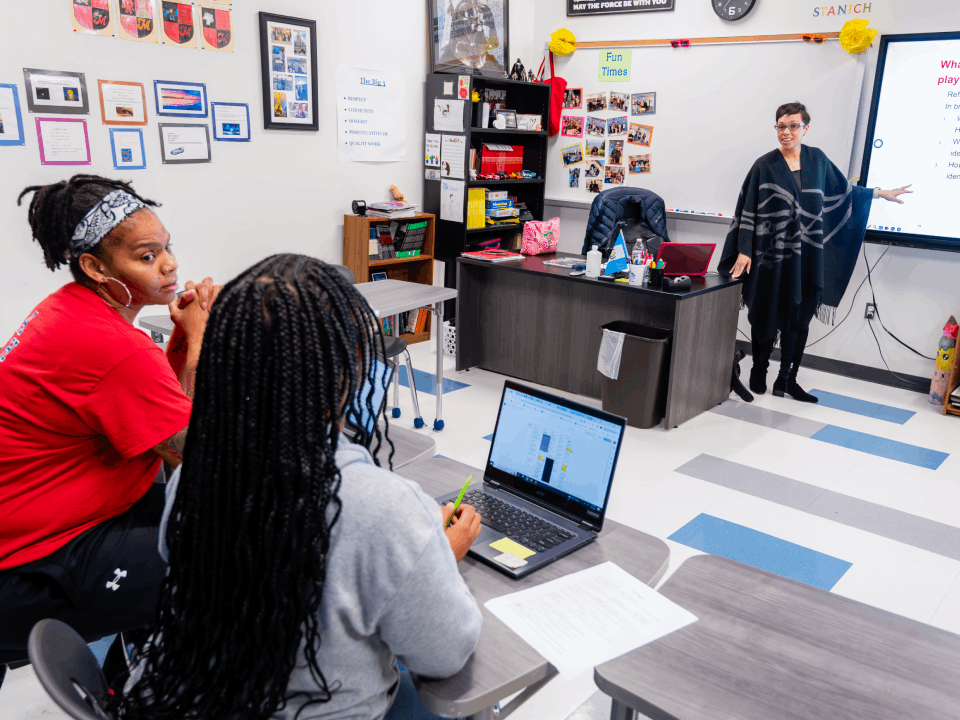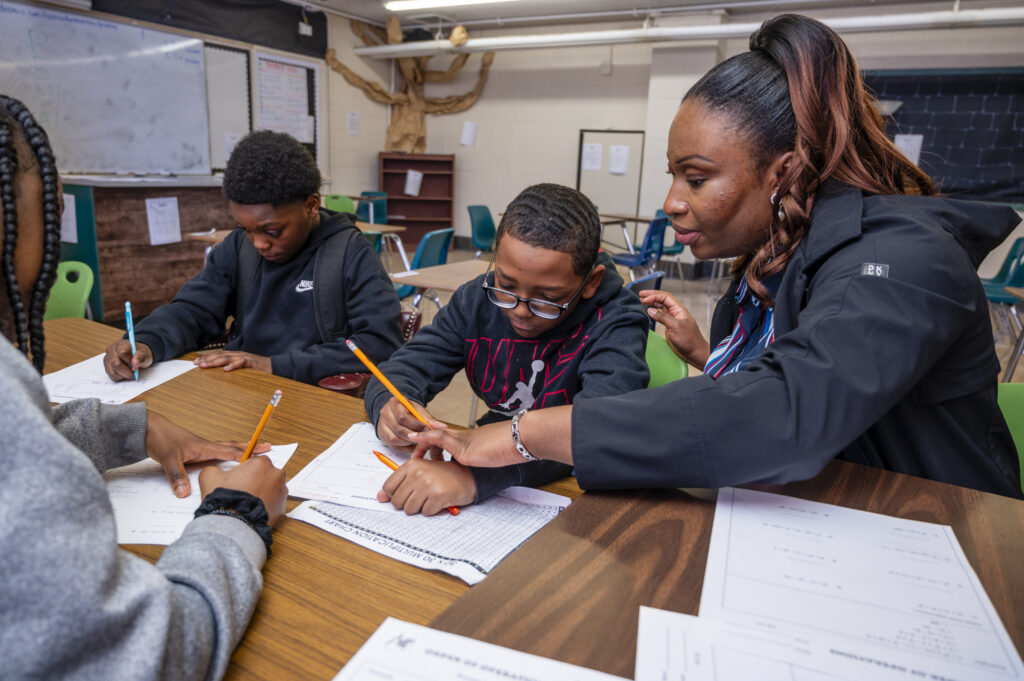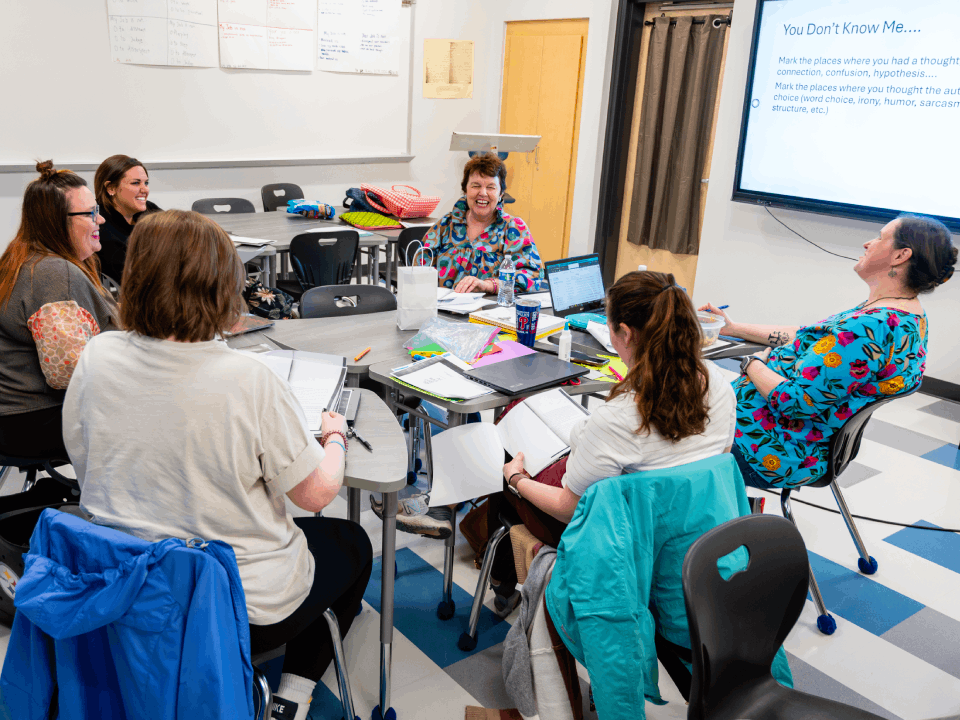National recognition has been lauded upon the tutoring partnership fostered between the Institute for Partnerships in Education (IPiE) and Guilford County Schools (GCS), but the work this group is doing extends far beyond one program with one school district.
Along with multiple projects with GCS, IPiE has been working closely with Asheboro City Schools, Rockingham County Schools, and Winston-Salem Forsyth County Schools. Among the projects are microcourse offerings for faculty, a dual enrollment program, a study to look at how to increase student engagement, and a plan to make high speed internet more accessible to students.
What began as a project to help erase COVID learning losses with a tutoring program just a few years ago has rapidly expanded across the Triad. According to Dr. Faith Freeman, co-director of IPiE, that has been possible because of personal relationships and the want to build programs that are sustainable.
Said Freeman, “We have been fortunate enough to really establish some true partnerships that are grounded in trust. I think our partners trust us. If we come to them with an idea or grant proposal and need a letter of support, they don’t blink an eye.”
Growing in Guilford
IPiE’s growth began with the partnership with GCS and the establishment of the Tutoring Collaborative. Today, this program recruits, trains, and supports full-time graduate students from every college and school on the UNCG campus to serve as tutors for K-12 students throughout the county.
The two have continued to work together through projects like Math and Science Teachers of Tomorrow (MST2) and Girls Who Game. MST2 works to prepare provisionally licensed math and science teachers by allowing these teachers to pursue a master’s degree in math or science education and earn a North Carolina teaching license. Girls Who Game encourages girls to participate in STEM fields through gaming.
A larger project that is currently underway is being led by UNCG’s Information and Technology Services (ITS) and is working to bring high-speed internet access to GCS students who may not have the ability to go online outside of school.
Rob Gorrell, lead architect of identity and access management at UNCG, said, “This project came about in a post-COVID world where the homework gap was very front-and-center coming off remote learning. This inequity of not having reliable high speed broadband access outside of school was affecting the student’s ability to learn on an even level with their peers that did have reliable high speed broadband access.”
The Technology Data Institute, a nonprofit organization comprised of area technology leaders, decided to tackle the problem with the goal of adding access points in homes, community centers, and school buses.
Gorrell said, “We wanted to do this through the entire life cycle of from where a student goes after school to them coming back the next day.”
The project, now two years into existence, supports over 1,000 student homes, community centers, and buses at four pilot locations. Over 100 individual families have signed up to participate.
For Gorrell, the benefit of bringing IPiE into this work was the previous relationship with GCS. “People like me, we don’t operate with an understanding of Guilford County Schools and K-12. So having IPiE be able to speak about that and having people like Faith (Freeman) and Elise (Robertson) that came to IPiE from the district itself gives us that insider.”
Young Partnership Blossoms in Asheboro

A trio of projects are underway between IPiE and Asheboro City Schools.
The two groups initially teamed up to offer a series of microcourse offerings as professional development opportunities for teachers in the district. Microcourses allow SOE faculty members to design and facilitate 1-3 credit hour courses that specifically address professional learning demands of teachers.
After initially being offered to elementary teachers, the microcourse offerings have expanded to include K-12 teachers.
According to Dr. Wendy Rich, the chief academic officer and assistant superintendent with Asheboro City Schools, the microcourses have added benefit beyond what a typical professional development opportunity would afford teachers, saying, “It’s personalized. Teachers get some choice in what they want to take and select, but it’s also high quality and they feel like they’re furthering their learning and their education.”
With the focus being just within the district, the knowledge the teachers are gaining has an immediate impact. They can have internal conversations about what they are learning and have a shared experience.
Chandra Manning, the district’s director of communications and talent development, added, “The majority of the courses have an aspect of project-based learning. Teachers were not just hearing about it but applying it to their classes right away. They were working with their partners within their school to implement and then report back on how things were going.”
Secondly, the two sides are working on the Exceptional Children’s Licensure Program. This initiative seeks to find an alternative pathway to licensure for teachers iof exceptional children . Many districts find that more teachers are entering the field through alternate pathways.
This program allows teachers to take classes through UNCG’s SOE to earn their licensure along with a master’s degree at little to no cost to the teacher. The second cohort of this program is currently enrolled.
The third program is new this fall and is a dual enrollment option for current Asheboro City Schools students. Beginning with their junior year, students who wish to pursue a career in elementary or middle grades education can participate in this program that will allow them to also take some classes through the UNCG SOE and is funded through the district.
Ideally, these students will continue to pursue education as a career and return to their home district to teach, helping to create a teacher pipeline and fill a need.
Said Manning, “The chance for them to take a college course early, get college credit while in high school and, potentially save almost half of their college expenses, could be taken care of while they’re in high school.”
After the success of the microcourses, turning to IPiE just made sense for the district due to the existing relationship.
Rich said, “We’ve always said if we were in the position to do some things differently, what would we do to make things better for students and for teachers. We said, ‘Let’s dream big.’”
Manning stated, “One of the key words in IPiE is partnership and I feel like it’s been a true partnership. We’re not just contracting out and somebody has their own agenda that they’re going to bring in. We’ve really been able to work together to make sure that we are producing something that is the best fit for our teachers and for our students. They are willing to be flexible.”
Reaching Students in Rural Counties

After an association with another university did not work out, Rockingham County Schools (RCS) turned to IPiE to help develop a tutoring program for its students. IPiE’s Megan Martin is a parent of an RCS student and was able to forge the connection.
In a district where 20 of the 23 schools are Title I schools, funds were available to create a partnership to provide tutoring services. The program began with a pilot at Reidsville and Holmes middle schools late last academic year that saw some UNCG students serve as tutors. With RCS at least 20 minutes from the UNCG campus, the groups have utilized virtual tutoring sessions too.
Dr. Charles Perkins, the assistant superintendent of curriculum and instruction with RCS, said, “UNCG has been tremendous with us. When the grants are over, their support doesn’t end. They continue to reach out to teachers; they continue to do (professional development) updates with us.”
One reason RCS appreciates the IPiE partnership is the flexibility available. IPiE made sure to find ways, like the virtual tutoring option, to involve more tutors and reach more students.
This year, RCS hopes to reach over 400 students through this tutoring program.
Newest Partnership Off to Strong Start
One of IPiE’s newest partnerships lies just west of the UNCG campus with Winston-Salem/Forsyth County Schools (WSFCS). The two groups are connecting through the North Carolina Practitioner Network Project in an effort to study student engagement within the district.
The NC Practitioner Network paired the district with IPiE in what now is a good match.
Stephanie Williamson, the director of grants for WSFCS, noted, “We were lucky to get partnered up with (IPiE) through that collaborative. I feel like we had an instant connection. We meshed very well together. They took the time to listen to us and what we were saying but prompted us to think deeper about what it was we were talking about.”
After initially wanting to look specifically at chronic absenteeism, the district went further with the encouragement of the IPiE team to narrow the focus to student engagement within the middle school population and its impact on absenteeism and discipline.
One challenge in this study is reaching those students who may not be engaged to make sure their voices are heard. Through conversations, the partners have looked at not only relying on the schools to get the word out, but plan to include community organizations such as churches and sports teams.
This marks the first connection between IPiE and WSFCS, but Shureka Hargrove, the district’s director of research and evaluation, hopes that it one that can go beyond this initial study. She said, “We’re always going to need a partner. I think we applied for 17 grants this past year. We always write in for research work, graduate student interns, outside consultants, which could be a university partner. If anything, we probably have more ways that we can partner with UNCG.”
Building Sustainable Partnerships

While universities across the country work with school districts, many of those arrangements are much more transactional in nature than what IPiE has built. University collaborators will often connect for a project, collect their data, supply the assessment, and then conclude the relationship. What IPiE wants to build are sustainable partnerships that last beyond an individual project and allow programs that are put in place to evolve and continue past the time of a potential grant.
Freeman said, “We’re working in tandem with that school district so that we can support them. That is what our complete and total mission is – that support of the school district and what they need, not what we think they need. We’re not going to help implement tutoring or help implement microcourses and just say, ‘OK, bye.’ Because (the districts) are not done. That puts all the work back on the school district and they have enough of them. And that’s not a partnership.”
Williamson echoed those sentiments, saying, “That’s very powerful for us and that’s what we want to do. We’re always looking at how we can sustain things once a grant is finished or a project is finished. The sustainability (of this project) will be embedding this knowledge and the information that we gain from it throughout the district so that it is not just a study that we did, but it’s really embedded in the work that we’re doing, not just now, but going forward.”
Building these types of partnerships takes time and a body of work, one that is rapidly expanding for the IPiE team. It also takes flexibility and a willingness to alter your initial plans.
After establishing the tutoring system with Guilford County Schools, that project has evolved. IPiE is continuously looking at what can be improved and is open to feedback from its partners.
IPiE’s goal is to “address educational inequalities by establishing and sustaining mutual collaborations focused on creating solutions to persistent problems of practice.” Having a partner with that goal is meaningful to districts in the region.
Perkins said, “It means a lot to us as a rural district. It means that we can count on UNCG and the partnership to provide support and innovative thinking. In a small district, we don’t have a lot of staff in the central office and the staff you do have are so busy doing work that the one thing we lack and miss sometimes is that creative think tank. UNCG has certainly served as a great partner for us and helped us think bigger.”
Moving Forward
Looking ahead, IPiE plans to continue to be a resource for districts in the Triad but would like to find a way to increase the reach. While there may be challenges in reaching districts farther away, spreading the idea and work through other universities could be an option.
For the districts currently partnering with IPiE, they see a future in developing new projects.
Williamson said, “There are ways that we can use (IPiE) moving forward in the future. I’m very excited about the prospects of that and building the relationship and continuing to nurture that relationship.
Asheboro City Schools wants to continue to build their current programs with Manning saying, “Ideally we want to see the teaching program grow from three to five or 10. I would love to see that we have more students who are supported and more students of diverse backgrounds who are ready to go into a field of education and that they can go into their university feeling very confident. With the microcourses we want our teachers to continue to grow. I think there is room to grow in all the four major things that they’ve been a part of.”
Looking at the big picture, Freeman loves the growth that IPiE has been able to make. She is proud of the work being done, but prouder of the team behind the work, saying, “We have a really solid, good team and without a solid, good team that shares our same beliefs, none of these things could happen. I could say that I’m proud of our program, but that program wouldn’t be successful if it wasn’t for a good team.”
There are a lot of programs that IPiE has helped to build, but it seems like the work is just getting started.






